

Spring 2023 YOUR Exams, cooking and our Moonshot Vision Plus Autism acceptance One family’s fight for better understanding Help with anxiety Dr Luke Beardon’s advice
Christine McGuinness
“What my diagnosis means to me”
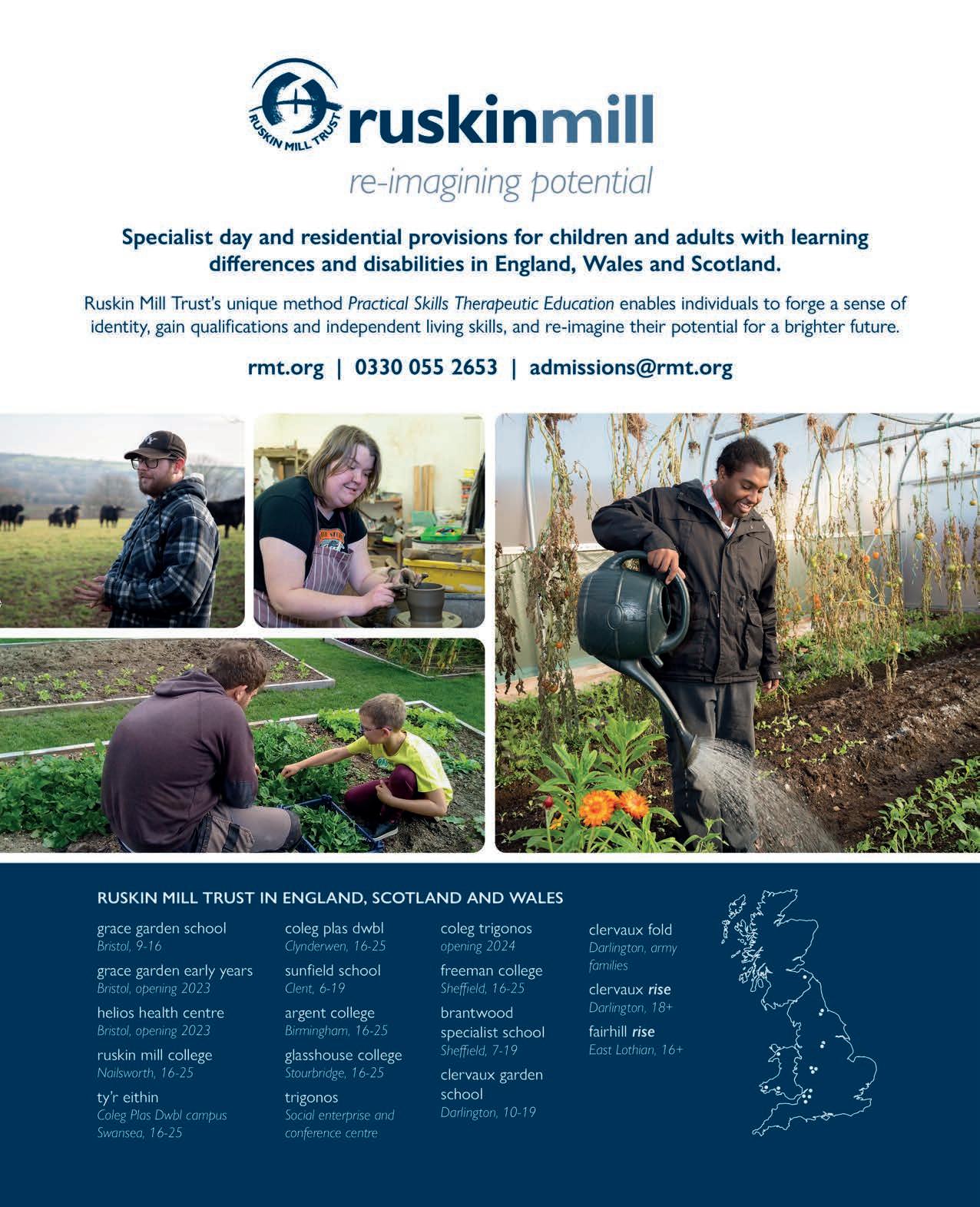
EDITOR
Suzanne Westbury
YourAutismMag@nas.org.uk
CONTRIBUTORS
Sophie Brown and Charlotte Gush
HEAD OFFICE
National Autistic Society 393 City Road London EC1V 1NG
Tel: 020 7833 2299 www.autism.org.uk
SUPPORTER CARE TEAM
0808 800 1050 membership@nas.org.uk
ADVERTISING
James Pembroke Media
Tel: 0203 859 7098 hoby.abdel@jamespembroke media.co.uk
SUBSCRIPTIONS
Only available to members of the National Autistic Society. To join, visit www.autism.org.uk
DESIGN AND PRODUCTION
CPL (Cambridge Publishers Ltd) 01223 378000 www.cpl.co.uk

1 Cambridge Technopark, Newmarket Road, Cambridge CB5 8PB
PRINT
Warners Midlands 01778 391000
National Autistic Society is a charity registered in England and Wales (269425) and in Scotland (SC039427) and a company limited by guarantee registered in England (No.1205298), registered office 393 City Road, London EC1V 1NG
© Your Autism magazine Spring Vol 57, No 1
National Autistic Society ISSN 2055-0413
The views expressed in Your Autism and any enclosures or advertisements are not necessarily those of the National Autistic Society. In the interest of providing readers with the widest range of information, we may include details of some of the many approaches to autism. However, this does not imply our charity’s endorsement of any particular approach or product. The inclusion of a website does not necessarily imply that our charity endorses or supports the group or individuals running the website, nor does the absence of a website imply that our charity does not endorse or support the group or individual running the website.
Cerys
Christine
Food for thought
Lydia Wilkins talks about her autism-friendly cookbook

Approaching anxiety
How we should help autistic people with anxiety


Readers to the rescue
Helping with housework
How do I... apply for exam access arrangements?
Notebook
Ranga’s story
“Nature
Kay
Things to read, do and see
I’m a... bell-ringer
Liam Lamb’s story
Spring 2023 3 What’s new A round-up of the latest news Update on our Moonshot Vision
progress so far My diagnosis
Our
story
Jones tells her
Interview
autism acceptance
McGuinness on her own autism diagnosis Increasing
on
the challenges of autism understanding
doesn’t
judge”
Ribbons-Steen on her work at a forest school
Contents
“Moonshot is a vision for the whole of societywe can’t reach it alone”
Spring 2023 YOUR 04 08 11 12 16 20 22 26 30 32 34 38 9 Help with anxiety Ranga and Sriman 16 26 Food made easier 22
What’s new?
Our round-up of the latest news and views
World Autism Acceptance Week
World Autism Acceptance Week is back, from 27 March-2 April 2023! Our theme this year is colour, and we have lots of fundraising ideas. Every penny raised will help us to create a society that works for autistic people.
Spectrum Colour Challenge
Get creative, have fun and raise money with a sponsored Spectrum Colour Challenge. Run, walk, bike, bake, dance or sing – whatever you do, make sure to add some colour! autism.org.uk/waaw
Lynne Madden (pictured) will be hula-hooping with a different
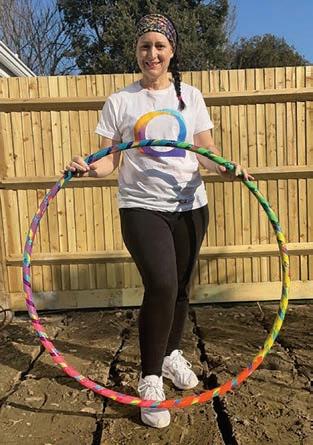
colour hoop each day of World Autism Acceptance Week. She said: “I am mum to five autistic children with diverse and complex needs. I want to spread as much awareness as possible for this amazing charity!”
Support us in schools
There are more than 220,000 autistic pupils in the UK, mostly in mainstream schools. If you work in a school, help increase understanding of autism using our free learning resources for all age groups. Visit bit.ly/ autismeducationtrust
Introducing our Glasgow Branch
We are excited to have launched our new Glasgow Branch! The branch aims to increase autism awareness in the Glasgow community and to push for better local services for autistic people and their families.
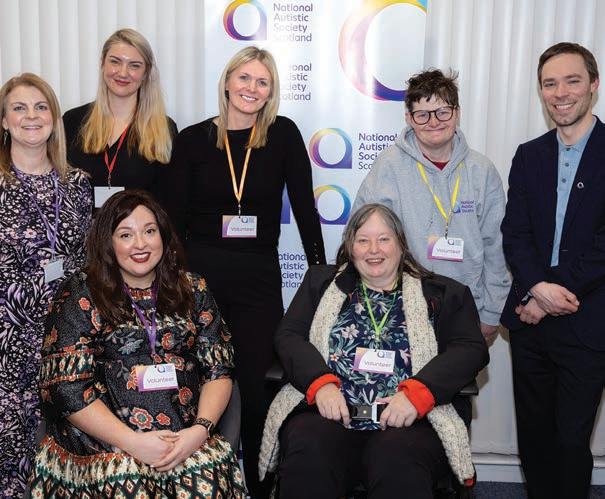
Remmea Moohan, volunteer Chairperson of the new branch, said: “Far too many autistic people and their families don’t get the understanding or support they need and end up feeling isolated. This is why our branch will be so important. It’s an opportunity to make sure autistic people and their families feel part of our local community in Glasgow, and to let them know they have a place where they will be welcomed and supported.”
Find out more at autism.org.uk/what-wedo/branches/glasgow
4 Your Autism
Get in touch!
The SEND Improvement Plan is
here
In early March, the Government’s long-awaited SEND and Alternative Provision Improvement Plan was published. The plan aims to improve the special education needs and disabilities (SEND) system in England.
The plan announces new funding for SEND, which will be used to recruit more school staff and simplify the process of getting education, health and care plans. The Government will also invest in 33 new special free schools. This could be great news for some autistic children and young people.
However, the plan as it stands isn’t anywhere near enough to fix the broken SEND system. We’ve been campaigning since 2016 for all teachers to receive training in supporting autistic students, and the Government still hasn’t implemented this.
Our School report 2021 showed that the education system is simply not working for autistic children in England, and parents still face exhausting – and sometimes years-long battles – to get support for their children in school.
We’ll be launching our new education report soon, with our recommendations to help make the education system truly work for autistic pupils. We believe that much more can be done to transform the experience of autistic children at school.
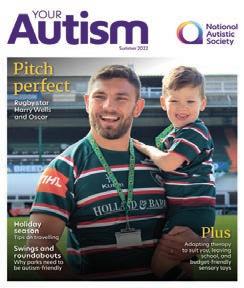
Read more at autism.org.uk/SEND-plan
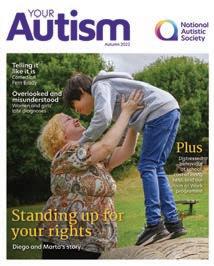
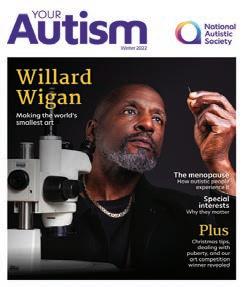
New in Primark
Haico’s brand, Mindful, will be released in Primark from April 2023. The team is very proud of the new Mindful product range, which is specifically developed for children on the autism spectrum and those with Sensory Processing Disorder. It takes all the fun elements of novelty stationery and includes some subtle additional tweaks to give that extra support that children with neurodiversity can benefit from. Haico will pay 20% of the profit from this promotional venture to the National Autistic Society.
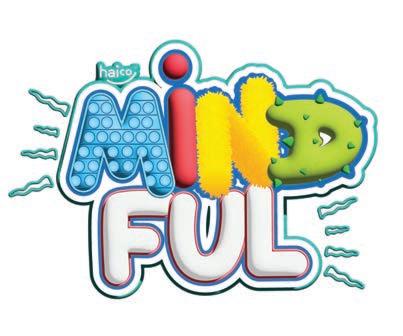
Get crafty


Our Arts and Crafts Online Branch is a safe space, open to all across the UK to meet other people and do some arts and crafts together. This could be sharing a recent art or craft project or taking part in a monthly challenge. Sessions take place on the first Monday of the month from 7-8pm via Microsoft Teams. Email artsandcrafts. onlinebranch@nas.org.uk to access the online meet-ups or visit facebook.com/ NASartsandcrafts
Magazine survey
It’s really important to us that this magazine provides you with relevant information and advice. Our readers’ survey is open now and it would be great if you could help us understand how we can develop your magazine in the future. Please share your views at smartsurvey.co.uk/s/YAM2023 by 30 April 2023.
Spring 2023 5
News
Diary dates
27 March – 2 April 2023
World Autism Acceptance Week
Our favourite week is back! Get involved at autism.org.uk/waaw
23 April 2023
Virtual TCS London Marathon
Your race. Your way. This is your chance to be a part of the world-famous London Marathon event from the comfort of your own hometown. Find out more at autism.org.uk/virtual-tcs-londonmarathon-2023
13 May 2023
Yorkshire Three Peaks Challenge
Trek over the famous Yorkshire Three Peaks in a single day. Sign up at autism. org.uk/Yorkshire-Three-Peaks
10 June 2023
Giant’s Causeway Challenge
Join us on an epic adventure at this famous Northern Ireland UNESCO World Heritage site. Apply at autism.org.uk/ giants-causeway-challenge
1 July 2023
Jurassic Coast Challenge
We can’t wait to trek the stunning Jurassic Coast in 2023! Register at autism.org.uk/ Jurassic-coast-challenge
12 August 2023
Snowdon Trek
Join Team Autism and climb Snowdon to raise funds for the National Autistic Society. Apply at autism.org.uk/ snowdon-2023
10 September 2023
Great North Run
A truly classic challenge to take on. Sign up at autism.org.uk/great-north-run
Overwhelming support for Commissioner in Scotland
A report by National Autistic Society Scotland and Scottish Autism has found that 96% of people surveyed support a Commissioner to promote and protect the rights of autistic people. The report urges the Scottish Government to move forward on its commitment to establish a Commissioner.
The organisations surveyed 1,215 autistic people, family carers and professionals working with autistic people; 58% said they need mental health support for themselves or for an autistic person they support, and 49% said they need support in education. Yet too many are struggling to get the help they need.
Nicola Cameron, pictured above with son Alex, said: “Our experience has been prolonged, frustrating and confusing. We have been left to navigate the system on our own, learning as we go and funding everything ourselves. A Commissioner could help create a more joinedup system that prioritises individuals’ needs, and fights for recognition of the autistic community.”
Rob Holland, Director of National Autistic Society Scotland, added: “A Commissioner for autistic people was an SNP manifesto commitment at the last election, but we’ve only inched forward. With the delay in the public consultation until the end of this year, there’s a very real concern that this important work is simply not being prioritised.” Go to autism.org. uk/Commissioner to read the full report.
 Join Team Autism at one of our events:
6 Your Autism
Join Team Autism at one of our events:
6 Your Autism
Volunteer and help us create a society that works for autistic people
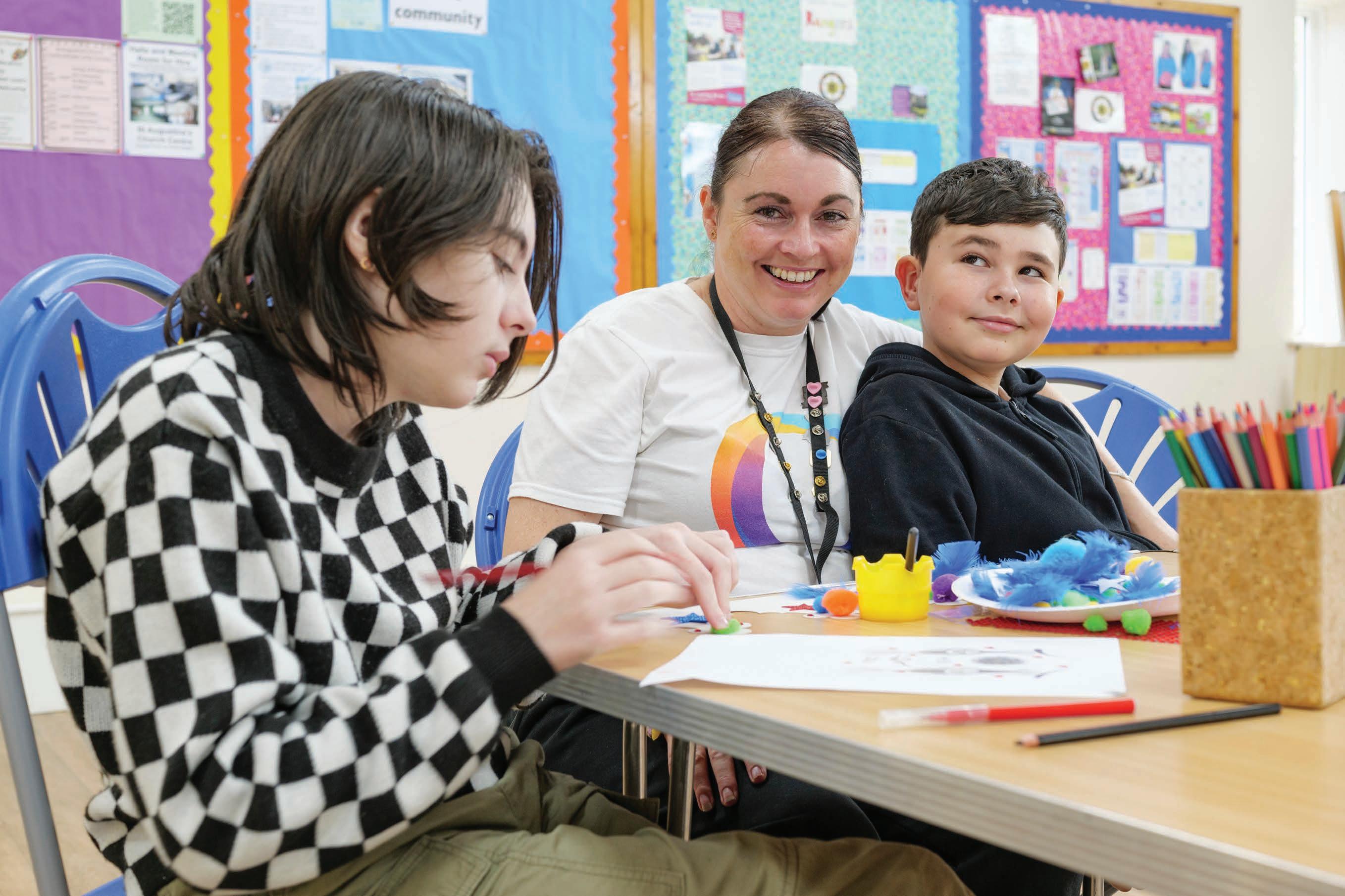
We have a variety of volunteering roles, from getting involved in activities at our local branches to helping out with administration, or sharing advice and offering support to autistic people who are socially isolated.
If you are looking to connect and contribute to your local community, gain practical work experience or share your unique talents or skills, then sign up to become one of our volunteers.
out more autism.org.uk/get-involved/volunteer
Find
The National Autistic Society is a charity registered in England and Wales (269425) and in S cotland (SC039427) and a company limited by guarantee registered in England (No.1205298), registered office 393 City Road, London EC1V 1NG.
Update on our Moonshot Vision
In 2022, we asked you what a society that works for autistic people and their families would actually look like. This is what you said
We launched our ambitious Moonshot Vision project to get a better understanding of what a society that works for autistic people and their families should look and feel like.
This project aimed to give us tangible goals to aim for – not just for our charity, but also for the whole of society, including other organisations, campaigners and governments. Throughout the project, we spoke to autistic people with a wide variety of needs, and from different age groups and backgrounds. We reached out through social media, workshops, surveys, interviews, discussions and creative activities. Thank you to everyone who contributed and helped shape the Moonshot Vision; it would not have been possible without your contribution.
The results Our Future Realities
Autistic people and their families told us a society that really works for them:

8 Your Autism Future
● Values autistic individuals – It understands and appreciates what autism is and how it is unique for each individual.
● Maximises autistic power – Autistic people are empowered to control how they live their lives and make distinctive contributions that influence the world.
● Guarantees support – It provides seamless diagnosis support and care for autistic people from all backgrounds, at all moments of need throughout their lives.
● Adapts public spaces and services –It designs spaces and services that are autistic-inclusive, with flexible adjustments that recognise not all autistic people have the same preferences.
● Is free from discrimination –It rejects stereotypes and stigma, removes the expectation to mask, and doesn’t accept being told to fit in as acceptable.
What happens now
Moonshot is a vision for the whole of society. It’s not something we own – and we certainly can’t reach it alone. Just like NASA’s mission to land a spacecraft on the moon, it’s going to take hard work and many talented, passionate people to make the Moonshot Vision a reality.
For our charity, Moonshot will be central to everything we do. We have mapped out the steps we need to take to achieve these Future Realities – our ‘Milestones’. We have Milestones across key areas of life, such as work, education and diagnosis. Our Moonshot Vision report at autism.org.uk/ moonshot sets these out in more detail.
Our new organisational strategy will put us on a path to achieve our Moonshot Vision of a society that works for autistic people. Everyone who is supported by us, works with us, volunteers or fundraises for us will be part of achieving it too, and will understand the pivotal role they play.
Future Realities
A society that works for autistic people and their families Values autistic individuals Adapts public spaces and services
We look forward to sharing more about our new strategy with you, and how you can get involved as a member, in our summer issue.
Read the full results of our Moonshot Vision project at autism.org.uk/ Moonshot
Future Spring 2023 9
autistic
from discrimination
support
Maximises
power Is free
Guarantees
The Moonshot Vision
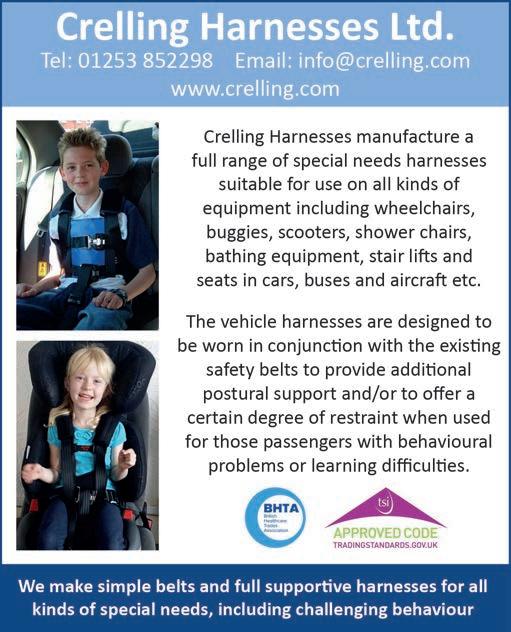
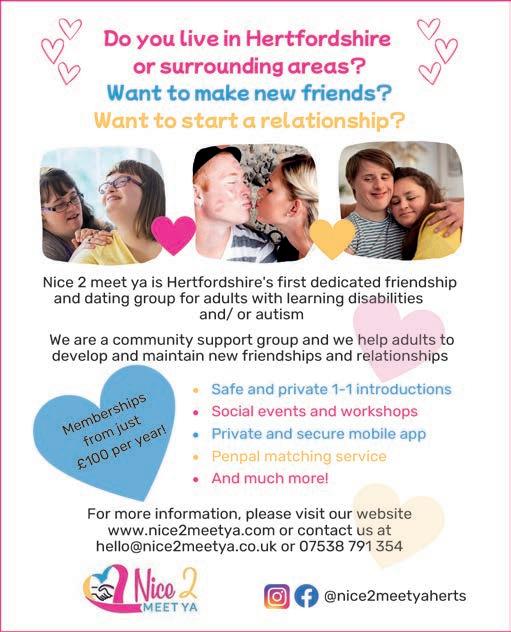

“My entire life has started to make sense”
Cerys Jones on receiving an autism diagnosis aged 24 and how it explained everything that came before
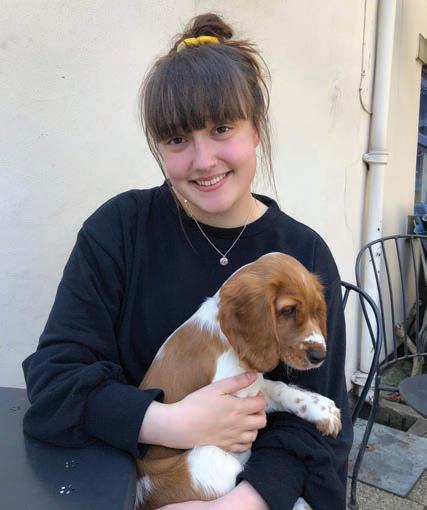
When I started therapy last summer, I didn’t picture myself receiving an ASD [autism spectrum disorder] diagnosis only a few months later – but here I am.
There had been moments in my life when I had considered that I may be autistic, but I had never considered it seriously. I felt I had things under control, that while I abided by a strict routine and had certain self-proclaimed ‘quirks’, I knew who I was.
From a young age, however, I got upset about very specific things. I didn’t like buying new shoes or clothes as they never ‘felt right’. I hated any change of plans, to the extent that I would have emotional meltdowns. I have always lived for routine; wanting to know every microscopic detail about everything, so that I had something I could predict and navigate my day around.
As an adult, I started therapy after leaving my workplace because of my mental health. My aim was to decrease
my emotional sensitivity, understand myself better, and improve my quality of life. I told my therapist some things that cause me extreme upset, and they asked if I had ever considered that I was autistic. I had, but I’d never pursued it. Alongside my therapist, I pursued a diagnosis and received it formally a few months later.
When my assessor asked how my diagnosis made me feel, I said it made me feel sad for my younger self, as I never had anything to call ‘this’.
My entire life has started to make sense. I am more patient with myself; I understand that I need to work with my issues instead of against them. I also have boundaries in place so I don’t deplete my social battery, I add change into my life slowly, and I unmask a bit more – reveal my true self to family and friends rather than putting on a brave face.
My diagnosis has changed my life in positive ways, and now myself and the people around me really do know who I am.
My diagnosis Spring 2023 11 Read more stories from women and non-binary people who were diagnosed later in life at autism.org.uk/now-i-know-your-stories Cerys blogs at lifeascerys.blogspot.com Want to share your or your child’s diagnosis story here? Email YourAutismMag@nas.org.uk
“My children are my biggest inspiration”
The reality TV star, model and author Christine McGuinness is mum to three autistic children and received her own autism diagnosis aged 33. Her new children’s book, Amazing me, amazing you, blends her family’s experiences with important messages about the uniqueness and diversity of kids on the spectrum
 Interview by Charlotte Gush
Interview by Charlotte Gush
Interview 12 Your Autism
Hi Christine! Congratulations on your book. What inspired you to write it?

My three children, who are all autistic. I wrote it when we were at Center Parcs, and that’s where most of the inspiration came from. We don’t really do holidays because of the change to routines, so we’ve tried to start with little holidays in the UK. At Center Parcs, there was just so much that the children were conquering. They were dealing with an awful lot, but they were absolutely smashing it. A lot of the quotes and the anecdotes in the book came from that trip. The children are my biggest inspiration. I’m so proud of them and I hope I make them proud with this book.
Do you wish there had been a book like this when you were a child?
Definitely. Autism was never mentioned when I was at school. When I was a child, I’d never heard of it, or even throughout my 20s. I think if I’d read this book as a child, it would have helped an awful lot. It could have potentially stopped things that I’ve suffered with, like having an eating disorder that was down to sensory food aversions. It was simply labelled as being anorexic and kind of fobbed off with, “Well, she’s a young girl, she’s obviously body conscious,” and I really wasn’t at all – I just couldn’t
cope with the busy dining hall at school, the noise, the chaos, then the food, the textures, the smells.
If I’d read this book, where part of it talks about sensory issues with food, then I might have been able to say, “That’s me. That’s all it is. I’m quite happy to eat things that are dry and beige. If you just allow me to eat things I’m comfortable with, I will eat,” instead of, “I just don’t want to eat anything at all.” It could have made a huge difference.
The book illustrations are so playful. Tell us about them. When I first met the book publishers, I said I wanted to be heavily involved with the illustration. That was so important, because I’m quite a visual learner and my children certainly are. I taught them to speak using PECS picture cards. Visuals are so important to us, and most SEN children. So I wanted to make sure that everything on the page – not just the text, also the whole image – was able to tell the story, whether the words were there or not. I worked closely with a talented illustrator, Hannah Jayne Lewin, and we included lots of familiar settings, such as schools, parties, the beach –things children would recognise.
The characters needed to be diverse to show that anyone can be autistic. Of course, there are currently more autistic boys than girls that are diagnosed, but I think
Spring 2023 13
Interview
If I’d read this book as a child, it would have helped an awful lot. It could have potentially stopped things that I’ve suffered with, like having an eating disorder
girls and women tend to mask an awful lot more. I know I do it daily, pretending and copying, and just trying to be like everybody else. That’s probably the main reason why there are fewer girls getting diagnosed and why women are getting diagnosed later in life, like me. It’s not just your typical young boy in the book; there are lots of little girls in there too, of different races, different ages. That was just so important for me to include.
When did you first think you might be autistic?
I always felt different. I felt different at school. I knew that I struggled more – sensorially, and with socialising – but I didn’t know what it was. It was only after having the children, and they were diagnosed, I thought, “They’re very, very like me! I am very like them!” And all of these
things are getting flagged up as being signs of them being autistic, but because they’re just doing what mummy does, I didn’t realise it was anything that everybody else wasn’t doing. So, it was after having the children that I thought, “Okay yeah, that’s probably come from me.”
What did it mean to you when you received your diagnosis?
It was a huge relief to know I wasn’t going mad. To know that I was going to be able to show my children that mummy is autistic and it’s not going to hold me back; you can grow up, be independent, work, and have a relationship and a family one day, if that’s what you want to do. That was the most important thing: for my children to not feel different within the family and for them to be able to say, “We’re all autistic, mummy’s autistic too. And that’s okay.”
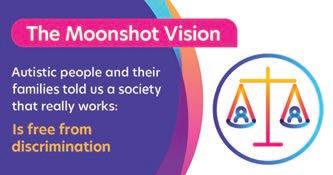
What has life been like since you received your diagnosis?
It’s been a whole new adventure. I’ve accepted the way I am. I used to give myself a hard time for overthinking, my lack of decision-making, my timekeeping, the fact that I like routine and don’t like change – all the things I used to really put myself down over. Since my diagnosis, I say: “This is me. This is how I am.” I’m just going to accept it and enjoy it, and push myself in areas that I want to achieve. Like socialising, for example. I’d always wanted friends and struggled to make them, or keep them. I’d have people wanting to be my friend, but I just didn’t know how to continue it. I didn’t realise it was something you had to do. You’re supposed to text people back! I never did, and then I’d sit there saying, “I haven’t got any friends.” That’s something I’ve really worked on – I now put dates in my diary to socialise.
It’s World Autism Acceptance Week from 27 March - 2 April. What does autism acceptance mean to you?
Autism acceptance, to me, means to be included, to be understood and celebrated. With all of those things, that’s true acceptance.
● Amazing me, amazing you, by Christine McGuinness (Scholastic) is out now.

14 Your Autism Interview
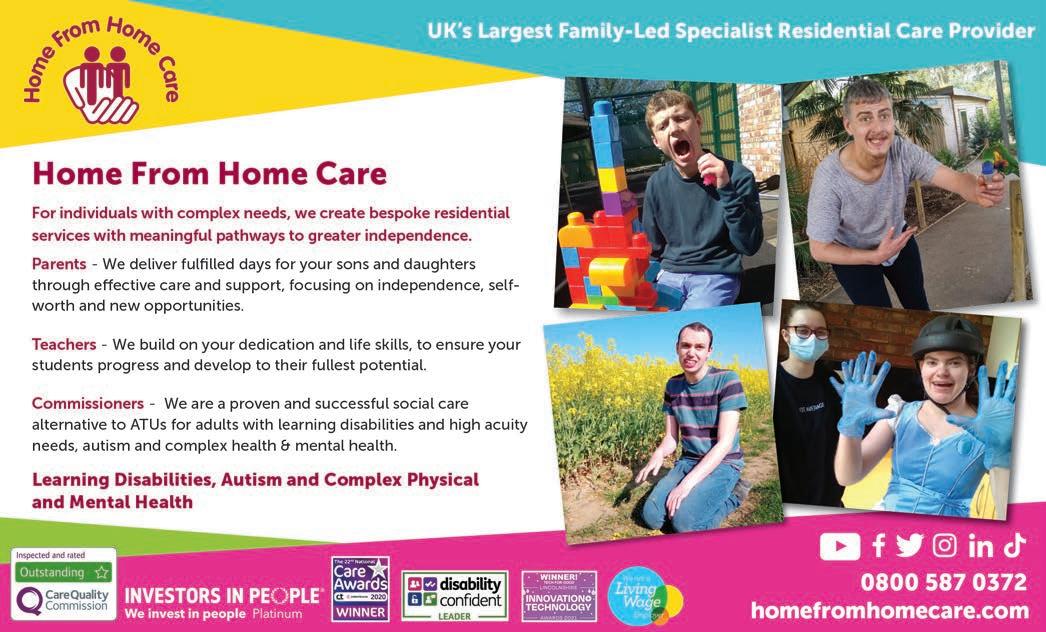

Increasing autism acceptance
Ranga’s son Sriman was diagnosed as autistic aged four. Since then, she’s been on a mission to learn as much as possible about autism. She writes about the challenges of improving autism understanding, and why she’s supporting World Autism Acceptance Week

Up until he was one year old, Sriman reached all his milestones. Then his speech started going down and he wanted to be by himself all the time. I had my daughter when he was two and he started having behaviour issues. I thought it was because of having a new baby in the house. I didn’t even know it was autism until a friend visited and recommended Sriman be seen by a paediatrician. We went to India for a while and Sriman was diagnosed as autistic when we came back, when he was four.
My first reaction was “Oh, it’s autism. Okay, let’s deal with it.” I took it very lightly, and my husband said, “No, you can’t; you know, it’s autism.” I realised I lacked knowledge, because I couldn’t tell people what autism was and what my child was going through. That’s when I approached the local autism centre and started networking within the autism community. I slowly started understanding my child and it became easier for me to help him.
Now Sriman is nearly 12. He can have a meltdown for any reason and we’ve got to deal with it. In adolescence, he’s going through changes in his body and mind. But I know him better now, and I’m able to help
him in a more effective way, to calm him down with music or with other techniques. It is hard, but I can understand what he’s going through. I now work in a school with autistic children and I’m doing my Master’s in educational psychology. It gives me meaning to why my son behaves in this way. I’m enjoying this journey with him.
Finding solace in space
Sriman’s interest is in space. It started when he was five. He’s a mini Google; ask him anything and he’ll name it. He’s got an extraordinary amount of knowledge. He wants to teach people what space is and what’s going to happen after 500 billion years! He’s on to astronomy now, and says things like, “Mum, you’re Capricorn, this moon is your friend.” Last year, we went to visit the secondary school he’s in now. In the physics
16 Your Autism
Our story
lab, he told the teacher something was wrong on the board – and it was! The teacher said, “Oh yes, that makes sense.” I’m so surprised and amazed by the fact he’s got this knowledge of space. So I envy him.
Sriman’s perspective now
Sriman understands he’s autistic, but, these days, he wants to run away from being autistic. He says, “I don’t want to be autistic, I don’t want to be named as different, I don’t want a quiet room. I don’t want anybody to treat me as special.” He feels the pressure of being different, which makes me feel sad, because I want him to accept who he is. It breaks my heart, because he’s beautiful in his own way. It will take time for him to understand and value how beautiful he is. He’s been bullied. If a child is vulnerable, they can be the target of children to be
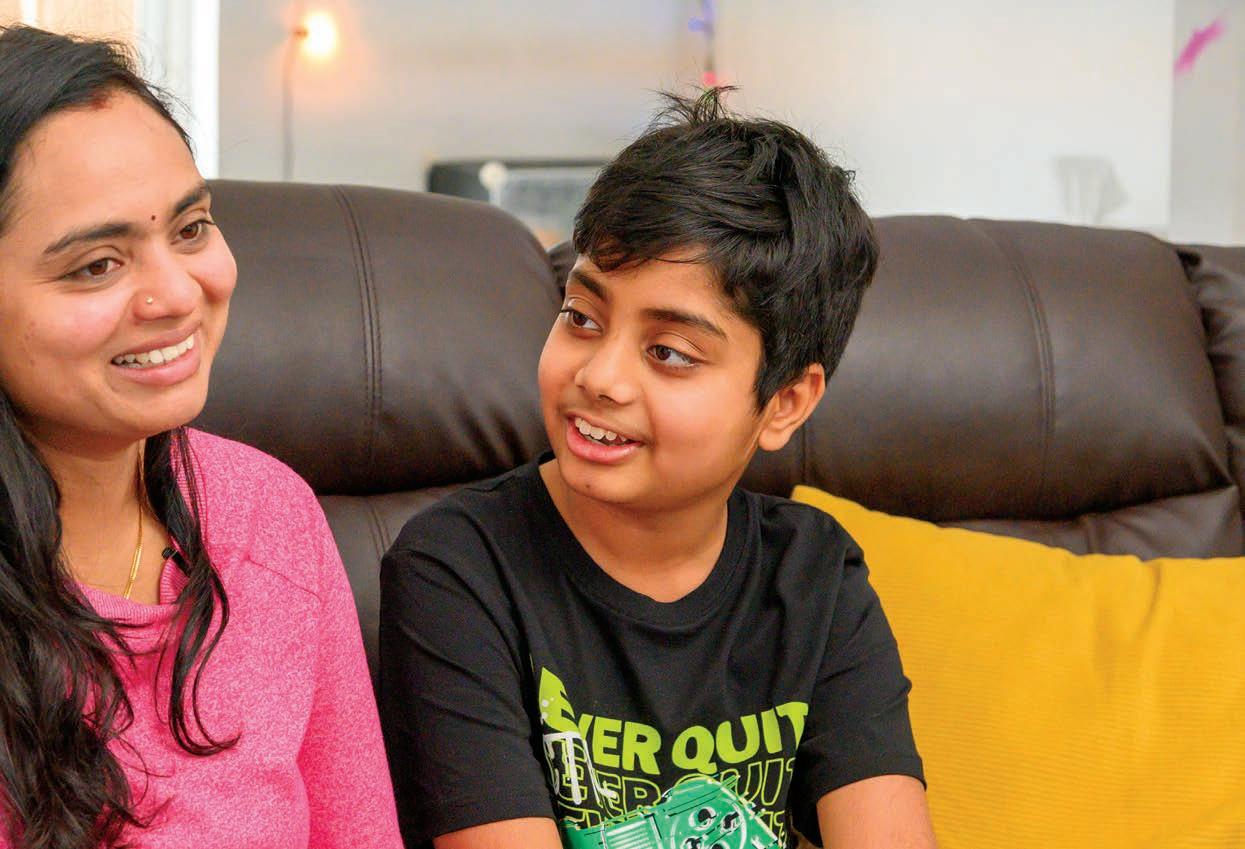
bullied. I feel sad because he feels that he wants to be a ‘normal’ child. If I hear that, my blood boils, because it’s fine to be different.
Family and societal understanding
My extended family still don’t understand autism at all. They feel like, he’s talking now, he’s going to school, what more do you want? So they still need more awareness –they need to know this is real; it’s always going to be there, but it’s how you manage it. And it’s okay to be autistic, it’s okay to be
Our story Spring 2023 17
It’ll take time for him to understand and value how beautiful he is
different. I’m sure the more I keep raising it, the more they will understand, but it’s quite hard work to make people understand.
Some people in my community still cannot understand what autism is. Some ask, “When is he going to get better?” There is sometimes a parental attitude that my child can’t be autistic; my child can’t have any disability. They are ashamed to share anything like my child is autistic or has ADHD.
I see children struggling in mainstream schools and parents in denial. They don’t want their child to go to a special school, but these schools can do wonders.
That’s why I started posting my videos on social media. Every year, during World Autism Acceptance Week, I post my videos and my daughter’s videos to let people know what autism is, and what it means to be autistic –and to have a brother with autism. I’ve been trying my best to reach out, but there’s a long way to go.
I don’t think the public understands autism at all. At the airport, I told staff that Sriman is autistic and asked if they had anything that might help us. They gave such a nasty look to my son. I wanted to tell them that not all disabilities are visible, you just don’t understand what it is. It is so painful.
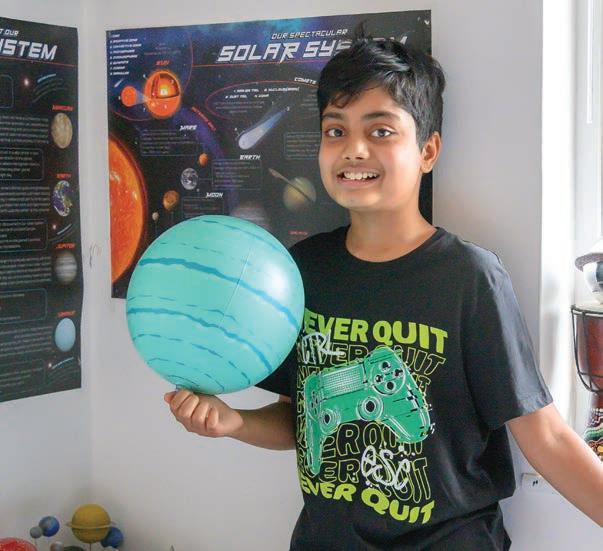
We went to the US and, when Sriman was anxious in a crowd, I explained to staff that he is autistic and asked if they would mind if we skipped the queue. They replied, “What’s autism?” I was so shocked. I thought they would know and understand, but they didn’t. So public awareness is lagging behind – not everyone understands. There is so much to do in education. It was hard to find a school,
because none of the schools were happy to take Sriman. They said straightaway, we can’t take your son; I’m sorry, we can’t deal with your son.
To other parents, I say: it’s a natural process of feeling overwhelmed when you hear about autism for the first time. But you need to know that the early years are the precious times when you can support your child rather than fighting, saying ‘no my child isn’t autistic’. Accept the children for who they are and give them the support they need.
Ranga and Sriman are supporting World Autism Acceptance Week. Why not join in and help create a society that works for autistic people? Visit autism.org.uk/ WAAW to find out more
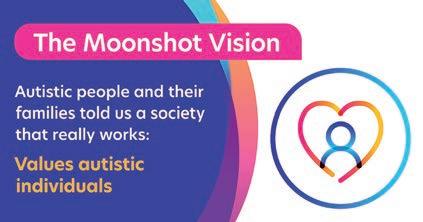
18 Your Autism
Our story
Sriman wants to teach people about space


Kay Ribbons-Steen is self-employed as a forest school leader. She tells us what working at a forest school involves and how she developed her passion for nature
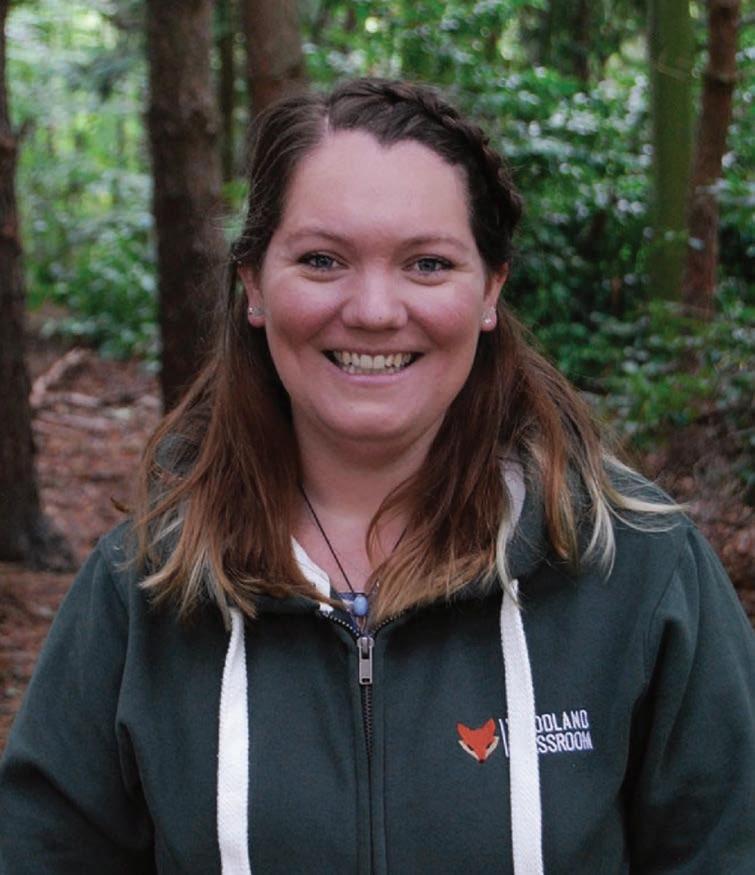 Interview by Sophie Brown
Interview by Sophie Brown
Could you tell us what being autistic is like for you?
I was diagnosed when I was 21. I’m 37 now, and I’ve been able to research autism and find different coping strategies that work for me.
The fact that autism is invisible is the hardest thing, as people still have perceptions of what autism looks like and the kind of people who have it. Someone like myself, who is self-employed and has a child – I’m often passed off as having nothing ‘wrong’ with me.
And there isn’t anything wrong with me, but I have everyday challenges, so I rely a lot on my wife. But by doing what I do now, I feel I’ve overcome a lot of the challenges.
Could you tell us about your career before you started working at the forest school?
I trained to be a teacher, and then studied nursing for four years, but I never qualified. Then I went to work in a bank, and that was awful. I realised that no matter how hard I tried, I couldn’t fit in.
So I became a bit of a hermit and was like, “Right, I’ve had enough of people.” But my wife said to me, “You’re limiting yourself; you need to push yourself.”
I applied for an apprenticeship with my local countryside and coastal council, which changed my life. I strongly feel it was nature that helped me get through that job, as I felt like I had a purpose: contributing to Mother Nature.
I then set up a project with Mind, which was all about getting people back into contact with nature and doing things such as campfire cooking and walking barefoot – a lot of mindfulnessbased stuff.
Work 20 Your Autism
“When you’re in nature, you’re not being judged”
What does your work at the forest school involve?
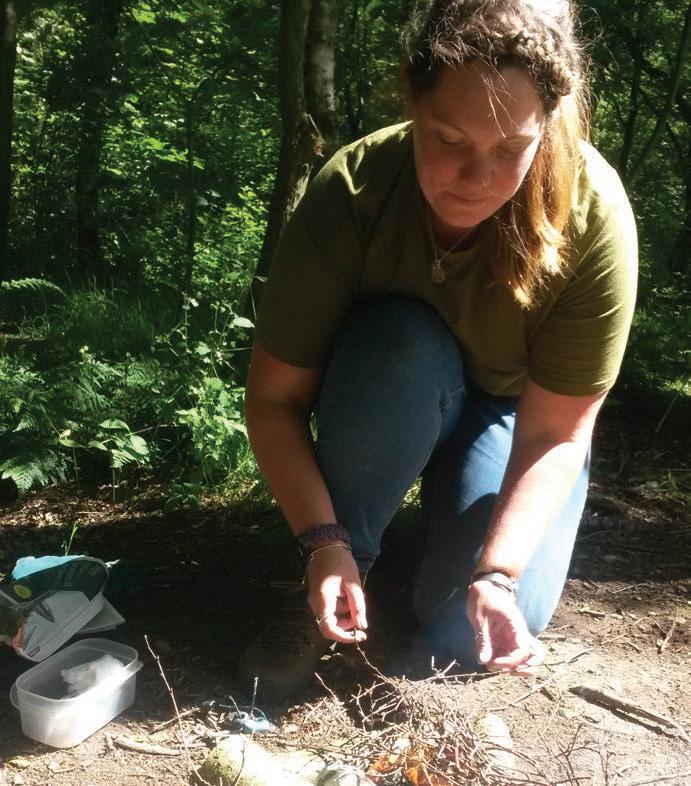
A lot of my work is about getting people to feel empowered. Children attend my sessions all the way up to adulthood, and they’ll be doing things like lighting fires without matches, building weatherproof dens, foraging. Being in nature gives them a chance to explore and play, and not have to worry about things. It’s a stimulating environment where you challenge yourself, but it’s really calm at the same time.
What do you like most about nature?
When you’re in nature, you’re not being judged. Most things in nature have their own idiosyncrasies, whereas in the real world, people are constantly judging you and seeing which box you fit into. Nature feels like a really safe place.
What do you enjoy most about your job?
Every day I see little light-bulb moments – people reconnecting with nature, or somebody feeling peaceful or empowered. Parents say to me how grateful they are because after they have been to my sessions, they feel more comfortable taking their children out in nature. It’s those moments of innocence and those moments of connection.
What’s the most challenging part of your job?
Because I am self-employed, a lot of the projects I work for are temporary, so there’s a lot of risk –there’s no routine. But I think the benefits outweigh the negatives for me, because I don’t have to deal with meetings and social stuff, and
that’s the stuff that used to take me hours to recover from.
How have you found working while being a mum?
It’s really hard because my little girl has got her own needs that need to be met. I have a job to do when I come home as well. But I think it’s actually given me that drive because it’s made me think, “I’ve got to show my little girl that you can be whatever you want to be,
and it doesn’t necessarily come easily, but you can find a way around these things.”
What’s your advice to other autistic people who would like to work in nature?
Start out small and see where it takes you. Volunteer with local wildlife groups, litter pick, take part in tree planting. It might not open up a career, but no moment in nature is ever time wasted.
Want to be featured here, talking about your job or volunteering role? Email YourAutismMag@nas.org.uk
Spring 2023 21 Work
Food for thought
Freelance journalist Lydia Wilkins has written the first autism-friendly cookbook. We chatted to her to find out more
What prompted you to write The autism friendly cookbook?
In 2020, I was made aware I was eligible for Personal Independence Payment (PIP). To cut a long story short, I ended up going to a tribunal. Some of the statements in the assessment were inherently offensive to me. They said I could just learn how to do particular tasks. By that logic, I can just learn, therefore, how not to be autistic. One of them was, apparently, I could just learn how to cook. But I thought, there are multiple things at play here! The assessment planted an idea though. I thought, there needs to be an autism-friendly resource around cooking. Some of the most basic things you need to know when you come to be diagnosed are around what makes you autistic, but you’re never told how to cope. So I pitched the idea of an autism-friendly cookbook to Jessica Kingsley Publishers – and here we are.

What are some of the barriers around cooking for autistic people?
If someone has sensory issues, and doesn’t know how to regulate themselves in that respect, that can be the first stumbling block. I interviewed 30 autistic people for the book
Cooking 22 Your Autism
© Shona Louise Photography
and virtually all of them said they struggled with sensory issues when cooking. When you’re making bacon, for example, you put it in the pan and the oil crackles. The sort of things that seem innocuous to a non-autistic individual, the people I spoke to were very often told they would just have to learn how to deal with. At school, lessons were taught in a very standardised way; they were never adapted. Accessibility to the kitchen wasn’t pursued for so many.
How does your book help with these issues?
Every recipe has an illustrated key for sensory and dietary needs. If you’re a sensory seeker or a sensory avoider, it tells you how to adapt it.

There’s a time given for each recipe, with quite wide time spans in case you have a co-morbidity, such as dyspraxia. There are energy ratings, showing how much energy making the recipe will take from you.
Each recipe has pre-preparation instructions. Autistic individuals often have a prepreparation stage that’s never written into how to make a recipe. If you don’t do it, it makes cooking really stressful. I’ve seen people really get quite cross and burn stuff because they have had to prepare ingredients on the fly.

In the method, I’ve tried to simplify the language as much as possible. A lot of cookbooks assume you have a standardised, quite high skill set or knowledge. So I’ve put in a list of terminology. It includes things such as when you melt chocolate over boiling hot water it’s called a bain-marie. I was trying to be as explicit as possible. It was important to do that.
Prize draw
We have three copies of Lydia’s book The autism friendly cookbook to give away to members. For your chance to win, please email your name and postal address to YourAutismMag@nas.org.uk by 20 April, quoting ‘Cookbook’ in the subject line. The winners will be announced in the next issue.
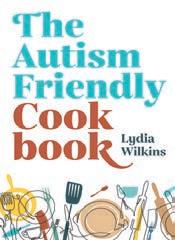
We assume our experience is very often what other people experience; we shouldn’t be doing that.
The book has illustrations but no photos, for a few reasons. One, because we should be letting go of the idea of how to make food perfect in the sense of always looking to a picture. Food is food and sometimes there’s high expectations for that. If there were photos, it would have made the book very expensive. Cooking should be accessible to everyone.
What has the response to the book been like?
It’s been really interesting. I’ve had a lot of contact from chronically ill individuals, and not necessarily autistic people. They told me the energy ranking on the recipes was really helpful and they’d like to see this more often. This comes back to the idea that accessibility is for everyone – it’s not just ‘special treatment’. Autistic individuals are so often forced to live in a society and conform to society’s rigid expectations. Maybe we are not the problem and there is a lot to learn from us. We have good ideas once in a while!
I’ve also talked to a lot of newly diagnosed people and parents, who may not necessarily know how to deal with sensory issues. There’s often this idea that people are just fussy, in the sense of a child having a tantrum. But so many parents tell me: “You’ve blown my mind by explaining this.”
Spring 2023 23 Cooking
© Illustrations are by Emily at @21andsensory
What would you like to see change to help more autistic people learn how to cook?
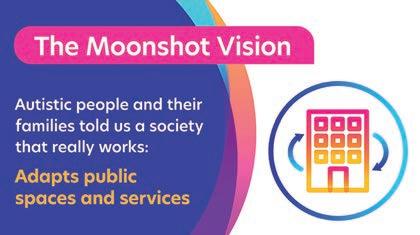
The first thing to change is the standardisation of cooking in a classroom. I don’t cope with sound particularly well, but the attitude was, “It’s a big fuss about nothing and you just have to learn to cope with it.” If it’s physically causing me pain, it’s stopping me learning; why should I have to learn how to go through that? To use a crude metaphor, if somebody had a broken leg, you wouldn’t tell them to walk through the pain. It’s the sort of thing I’d like to see undone in education. It helps no-one and, above all,
you’re being shamed. People do not learn through shame; people are silenced through shame.
What’s your advice to other autistic adults on learning how to cook?
Going slowly is helpful, as is letting go of neurotypical standards. Rather than thinking, “I’m living by myself now, I’m going to invite everyone round and make a threecourse roast dinner”, go slowly and start quite small – particularly if you’ve not had a great educational background. I found that really helpful.
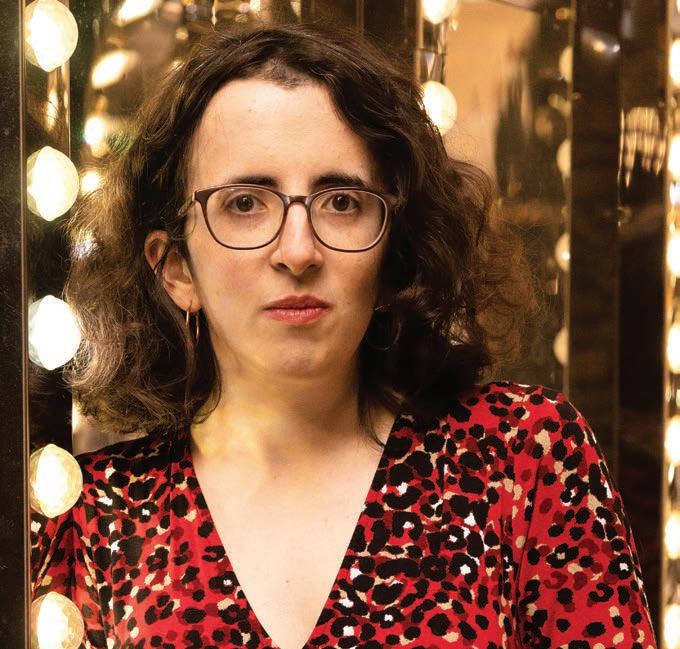
Having a diagnosis, even if it’s self-diagnosis, is important in the sense of knowing and understanding yourself a bit more. Know yourself and your sensory needs – I think that’s the best bit of information anyone can give, frankly.
What advice would you give to parents or carers on teaching their children to cook?
Ask questions. Read and hear from autistic people directly. Very often, if you just ask us, we’re able to tell you what we’re struggling with. Arbitrary expectations around food also need to be unlearned. A woman said to me her son had been told he was the worst person ever for not having the same standard Christmas dinner as everyone else. Why is that? He has sensory issues, he is enjoying himself, but we have this idea we can comment on other people’s food choices. It’s really the unlearning of the ideas we have around food and food culture. That needs to start happening rather than setting things in stone.
24 Your Autism
Cooking
Know yourself and your sensory needs – I think that’s the best bit of information anyone can give
© Shona Louise Photography

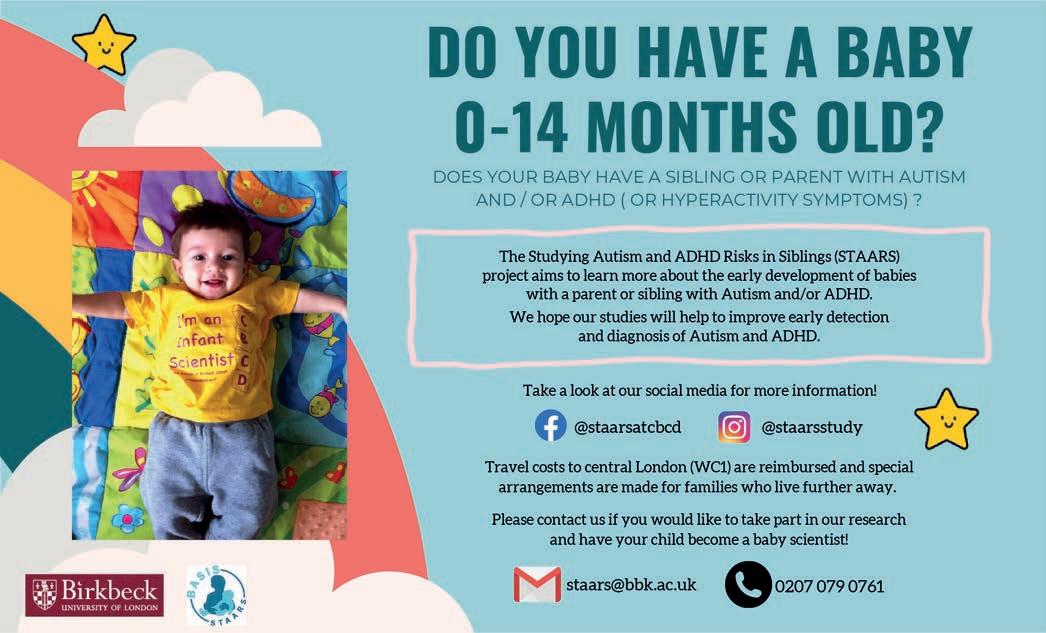
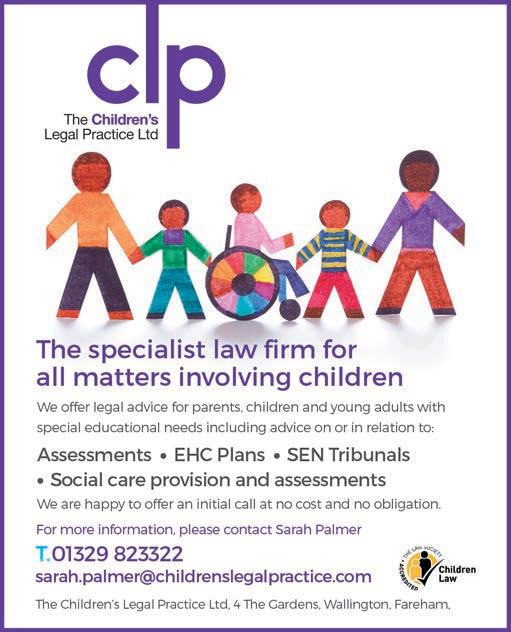
Approaching anxiety
Dr Luke Beardon outlines how we should be helping autistic people with anxiety
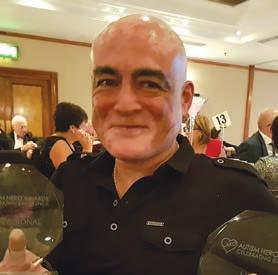
Without understanding what causes anxiety, there is not a lot one can do about it. So, my first tip for anyone trying to understand anxiety and what to do about it is to work out what the cause is.
Before that, however, I would suggest there needs to be an acceptance of what autistic anxiety means.
I have long since hypothesised that the concept of ‘autistic anxiety’ is a valid one. That’s not to suggest, in any way, that all autistic folk are anxious – they are not – or that the anxiety experienced by autistic people can’t be experienced by the predominant neurotype (PNT). I still feel, however, that the hypothesis holds some validity.
An important aside relating to the links between being autistic and being anxious is that – in my view – it is unforgivable to accept that being anxious is ‘simply’ a part of being autistic and, therefore, not a lot can be done about it.
This is unequivocally untrue and unacceptable. For example, children who are rejected by services that say they are anxious because they are autistic – and, therefore,
nothing can be done – are being misunderstood and disadvantaged. No-one is anxious ‘just’ because they are autistic. Something within the environment must be part of the cause, so something can always be done about it, however hard it is to find out what that something is.
Having noted that, many autistic people are anxious much of the time, to high levels, at great disadvantage. This is what I refer to as autistic anxiety, and I hope that anyone interested in the wellbeing of autistic people takes it as seriously as it needs to be taken.
My next tip is listen to the individual – your child, your partner, yourself. If someone is feeling anxious, irrespective of what others are experiencing, take it seriously, and take action. It is not okay to live in a state of anxiety – it rarely, if ever, has a positive outcome.
An essential rule is that at all times – in all environments, including all relevant folk – there is a conscious and considered questioning along the lines of: “Has everything possible been done to identify, and subsequently alleviate, anxiety for the autistic person?”
Advice 26 Your Autism

Spring 2023 27 shutterstock/ fizkes Advice
No-one is anxious ‘just’ because they are autistic. Something within the environment must be part of the cause
Prize draw
We have two copies of Dr Beardon’s book
Avoiding anxiety in autistic adults: A guide for autistic wellbeing to give away to members. For your chance to win, please email your name and postal address to YourAutismMag@nas.org.uk by 20 April, quoting ‘anxiety’ in the subject line. The winners will be announced in the next issue.
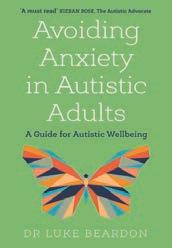
Until this is a standard process in the lives of autistic people, those individuals are at risk of harm. Then, break potential environmental factors into clear categories. I use six, as follows:
reduce the risk of exposure to anxious situations?
3Sensory
Without a good understanding of self, any individual is likely to be at risk of anxiety, and – importantly – at risk of not even knowing that they are anxious beyond what most people experience. Never make assumptions that a person even knows that feeling constantly anxious is not a state common among the population. Far too many autistic individuals assume their anxiety is just a part of life that has to be put up with. Learning about self – in particular, autistic self – is a journey that every autistic person should be allowed and encouraged to embark upon, in the safest of environments. In essence, the better one understands oneself, the better chance one has of identifying anxiety and then doing something about it.
1Self
The five primary senses, plus vestibular (the sensory system that creates our sense of balance and spatial orientation), proprioception (the awareness of the body in space) and interoception (the perception of sensations from within the body), are highly likely to have influence over the emotional state of any autistic person. All autistic individuals should have a sensory profile that is fluid – it will change over time and depending on the physical environment. What is essential is that the individual’s environment is mapped against their sensory profile, so that as much as possible is done to reduce risk of anxiety.
2Others How well do others understand the autistic person? How adept are they at recognising signs of anxiety, and what knowledge do they have to help
5Policies/procedures
Far too many PNT-orientated policies and procedures discriminate against and disadvantage autistic people. Any engagement with an autistic person needs to take autism into account or run the risk of being discriminatory. Inclusion policies, employment rules, behaviour policies – whatever the policy or procedure is, make sure it is fit for purpose for those autistic individuals to which it relates.

6Law
A whole book in its own right, but there are far too many areas within the criminal justice system that directly and negatively impact on autistic individuals (either side of the law). There needs to be so much work in this area before autistic anxiety is alleviated.
Finally, coping mechanisms might appear to be a great idea. “Look, she’s learned to cope with it so she’s okay now,” may, on the surface, seem to be a solution to anxiety. It is not. Coping is brother to masking, which is sister to anxiety – and so the vicious circle begins.
4Society
This is broken down into values, attitudes and knowledge. Does society value autistic people? Are societal attitudes towards autistic people affirmative, positive, and neurodivergent friendly? Does society possess accurate and useful knowledge around the autistic experience? I’ll leave you to answer those questions and reflect on what they might mean for an autistic person’s level of anxiety.
Coping strategies effectively mean one is accepting of anxiety and the solution is to make the individual put up with it –sometimes even to pretend they are not anxious. That way lies a very dark path indeed.
28 Your Autism
Advice
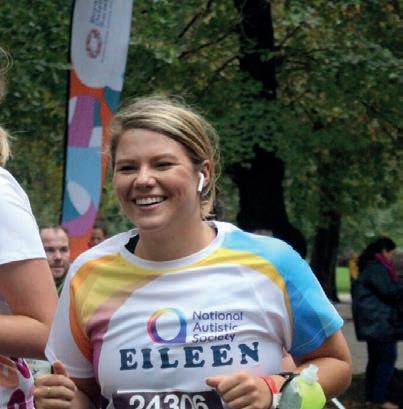
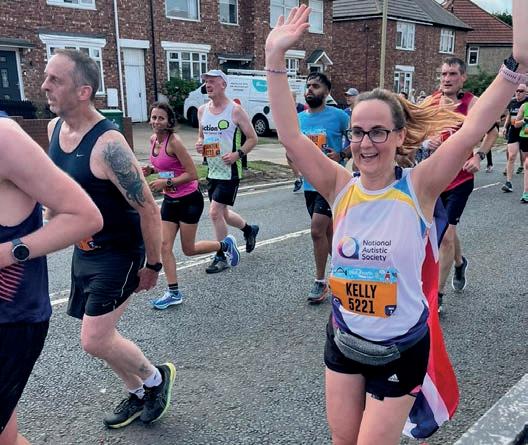


The National Autistic Society is a charity registered in England and Wales (269425) and in Scotland (SC039427) Take
www.autism.org.uk/running Sign up today and help create a society that works for autistic people. Join Team Autism for the world’s biggest and best half marathon, famed for its entertainment and party atmosphere! Great North Run 10 September 2023 Take in some of London’s most prestigious locations, set within four of London’s eight Royal Parks. Royal Parks Half Marathon 8 October 2023
on a half marathon with Team Autism!
Readers to the rescue!
Do you have an issue our readers can help with? Get in touch and benefit from the experience of your fellow members
QI was diagnosed as autistic (with ADHD traits) at 38. I have a history of depression and anxiety. I have struggled for so long with keeping my home clean and uncluttered. I am a huge procrastinator, have very low motivation and, if I do actually manage to do some housework, I get distracted or can’t do it for long. I get overwhelmed by everything that needs to be done. Any advice would be much appreciated. Anonymous
For extensive information and guidance about autism, visit our website: autism.org.uk
AI am 49 and autistic, and I’ve always struggled to get housework done. When I was about 40, I was referred to an occupational therapist. When she saw the state of my kitchen, her response was not to judge, but she said, “You need a cleaner,” and then helped me find one. It’s not a failure! And it doesn’t have to be for many hours if you can find someone who lives close by – advertise, or look for ads on noticeboards from people who do cleaning. Be aware that any cleaner will do things differently to you and, if you’re like me, you may find yourself putting things back where you like them after the cleaner has gone! Ametrine Lavender

Help me next!
If you have applied for deputyship from the Court of Protection, what are the pros and cons of applying yourself or using a solicitor? Also, has anyone got advice on applying successfully for welfare deputyship, which is said to be much more difficult to get?
Your Autism magazine reader
AI use the ‘five-minute rule’. Break everything down into bite-sized activities taking no more than five minutes. Focus on one room until you get it to look how you want it to look, and use that as a model to help motivate you to work on another room. Make sure you stop at five minutes, and only exceed five minutes when you genuinely feel motivated to do so. Set out a schedule so that these bite-sized actions get established as part of your routine. Good luck! Paul Fraser
Thank you for your great advice, Paul. You win a copy of Looking after your autistic self by Niamh Garvey.
30 Your Autism
us your solutions for a chance to win a copy of The #ActuallyAutistic Guide to Advocacy: Step-by-step advice on how to ally and speak up with autistic people and the autism community, by Jenna Gensic and Jennifer Brunton
Send
Post your problems or answers on Facebook at the National Autistic Society members’ group or email YourAutismMag@nas.org.uk
By writing to us with either a problem or an answer, you give consent for your letter to be published. We reserve the right to edit submissions. shutterstock.com/ kitzcorner
Your Autism
Join


Yorkshire Three Peaks – 13 May 2023
This exciting and rewarding challenge will have you trekking over the famous Yorkshire Three Peaks in a single day.
Giant’s Causeway Challenge – 10 June 2023
New to Team Autism for 2023! Join us on an epic adventure at this famous Northern Ireland UNESCO World Heritage site.
Jurassic Coast Challenge – 1 July 2023

Snowdon – 12 August 2023
At 1,085m high, Snowdon is the highest mountain in Wales and the highest point in the British Isles outside the Scottish Highlands.
Find
treks
Autism on a trekking challenge!
Team
The National Autistic Society is a charity registered in England and Wales (269425) and in Scotland
(SC039427)
out more about one of our
www.autism.org.uk/trekking and book your place:
Trek this beautiful coastline with us! Our Jurassic Coast challenge has two distances to choose from, 20km or 30km.
How do I… apply for exam access arrangements?
Andy Cutting, our Education Rights Lead, explains how to overcome the barriers autistic students face when taking exams

“You have one hour and 30 minutes to complete this exam. You may open your question papers and begin.”
Although years may have passed since you last sat an exam, for many, these words can still be the stuff of nightmares. They can conjure up feelings of dread and an unnerving sense of being unprepared for what’s to come. But for some autistic young people, taking an exam can be an even more daunting and overwhelming prospect.
It’s not necessarily that an autistic young person isn’t capable of achieving well in a subject, it’s just that there are barriers that prevent,
or at least hamper, their success in an exam environment. To make the exam process fairer and to try to overcome these barriers (that most other children don’t face), exam access arrangements can be made.
What are exam access arrangements?
Exam access arrangements are also known as special arrangements, or, for disabled students, reasonable adjustments. These allow students with special educational needs, additional support needs, additional learning needs, disabilities or temporary injuries to access an
assessment, but without changing the demands of the assessment.
Autism is generally considered to be a disability for the purposes of the Equality Act 2010 (in England, Wales and Scotland) and the Disability Discrimination Act 1995 (in Northern Ireland). Note that an individual does not necessarily need a diagnosis to be considered disabled; what matters is the effect of the ‘impairment’, not the cause.
Throughout the UK, there is a duty on awarding bodies to make reasonable adjustments where a disabled student would be at a substantial disadvantage in
32 Your Autism Advice
shutterstock.cocm/ Monkey Business Images
undertaking an exam compared with a non-disabled student. A reasonable adjustment may be unique to an individual and may not be included in a general list. The table, right, shows some common difficulties that autistic students can face when taking exams, the substantial disadvantage they’d experience because of that difficulty and the reasonable adjustments (exam access arrangements) that might avoid that disadvantage.
Awarding bodies are not required to adjust the academic or other standard being applied when conducting an exam. They are not expected to lower the pass mark for a disabled student, or exempt them from certain questions. For example, even though a question that involves analysing a piece of poetry requiring inferential comprehension (looking beyond the literal) could be difficult for an autistic student, they would still be assessed on it. However, the wording of the question needs to be accessible to all and unambiguous. Whether an adjustment is reasonable or not will depend on factors including the needs of the disabled student. An adjustment may not be considered reasonable if it involves unreasonable costs, timeframes or affects the security or integrity of the assessment.
How can arrangements be made for my child?
An exam access arrangement can be put in place if it’s the student’s ‘normal way of working’ during lessons. Reasonable adjustments must reflect the support given over the past few years. They must be requested in advance from an awarding body and there are often deadlines involved. Schools can apply for arrangements to be made
Difficulty
Substantial disadvantage due to the difficulty
Reasonable adjustment to avoid the disadvantage
Processing, organising, prioritising and sequencing information
Sensory differences –feeling overwhelmed by the size and unfamiliarity of exam halls. Things such as striplighting, noise, smells, an invigilator walking around the hall can all be distracting
Fine motor skills
Takes longer to understand what a question means, to plan what to do and to do it
Unable to focus on questions and therefore underachieving in an exam
Allow student to take exam in a separate room, either in a small group or alone and/or providing a prompter to keep students focused and on task
Takes longer to write and handwriting is difficult to read
Use a computer, or a member of staff acts as a scribe (writes down student’s answers)
Exams may increase anxiety because they are a new and unpredictable experience that mean a change in routine
Stress can negatively affect a student’s ability to think clearly, resulting in misunderstanding or incorrect and incomplete answers
with evidence of a student’s needs and, if an application is refused, they can appeal against it.
If you're an autistic student or a parent with concerns about your child as their exams approach, talk to school staff about applying for exam access arrangements.
If you’d like more information on what you can be doing to prepare your child for an exam, or what you can reasonably ask of a school, college or university, then you might like to read our online information on exams at autism.org.uk/exams
Supervised rest breaks
Our Education Rights Helpline (autism.org.uk/educationrights) also gives information, support and advice on educational provision and entitlements for autistic children and young people.
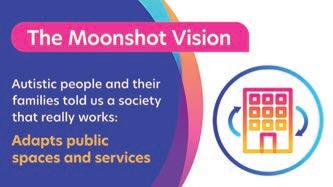
Advice Spring 2023 33
Extra time
Notebook
It takes a village: Navigating the journey of parenting your autistic child
AUTHOR: Lhara Mullins
PUBLISHER: Orpen Press
PRICE: £12.99
VERDICT: Reassuring, informative and empowering – read and share it
Inside our autistic minds
VERDICT: Brilliant, representative and deeply moving
Chris Packham’s ground-breaking BBC documentary shares the stories of four autistic people: Flo, Murray, Anton, Ethan and their families.

Chris helps each person to create a short film to reveal to their family and friends (and us) how they’re truly feeling inside. So we learn about Flo’s masking and how hard it is to be herself, and the messages that Murray, who is non-speaking, wants to convey to society. Anton shows his need for routine, while Ethan’s shares his hypersensitivity to noise.
The programme is very moving, showing both the passions and skills autistic people can have and how hard life can be without the right support. Our charity saw an overwhelming response to it on our social media channels from autistic people and their families who saw their experiences reflected.
I really enjoyed seeing each person’s story and what being autistic is like for them. Along the way, Chris shares his own feelings and experiences with each person, and it is so refreshing to hear two autistic people discussing the difficulties of making eye contact and being in noisy environments on prime time TV.
Putting autistic voices front and centre, this is how programmes about autism should be made.
Suzanne Westbury, Editor of Your Autism
Lhara, a mum of four amazing children, three of whom are autistic, promises a “real, raw and honest experience of parenting autistic children”, and she doesn’t disappoint. This is an extremely relatable, at times heartbreaking, but ultimately uplifting account of neurodiverse family life. Blending personal experience with the latest research, topics include getting and coming to terms with a diagnosis, coping with distressed behaviour, managing transitions, and helping your child forge friendships. With a focus on practical and realistic parenting solutions, this book will empower parents, but also professionals, family members and friends. You’ll want to share it with everyone you know.
Jane Garton, Your Autism reader
Prize draw
We have a copy of It takes a village: Navigating the journey of parenting your autistic child to give away to one member. For your chance to win, please email your name and postal address to YourAutismMag@nas.org.uk by 20 April 2023, quoting ‘Village’ in the subject line. The winner will be announced in the next issue.
The winner of last edition’s giveaway for a copy of Letters to my weird sisters is Vicky Barley. The winners of What I want to talk about: How autistic special interests shape a life were Kirsta Thumm and Janet Romain Congratulations!
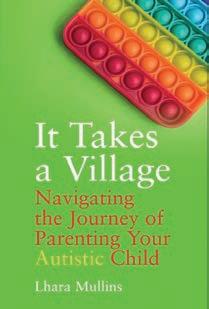
Everything you need to read, do or see
34 Your Autism
Earmuffs to the moon
AUTHOR: Hafiza Issa
PUBLISHER: Magic Mouse Books
PRICE: £7.99
VERDICT: Informative and insightful children’s book
This beautifully illustrated book follows Sara, a young autistic girl, on her journey through space. It touches on many autistic traits, including attention to detail, noise sensitivity, and how some autistic people
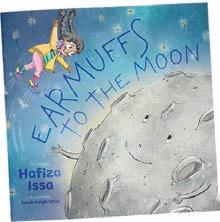
Our six favourite… chew toys
3 Chew Stixx Tough Bar
A strong and chunky bar, the Chew Stixx Tough Bar is ideal for sensory seekers. Sold by tinknstink.co.uk

1Spectrum sensory necklace
Our charity’s new colourful sensory necklace in a building block style is available now. Buy yours at autism.org.uk/shop

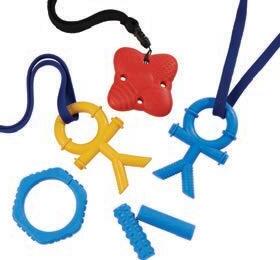
2 Chewbuddy™ range
Whether you’re looking for a sensory chew for the wrist, pencil or around the neck on a safety lanyard, the Chewbuddy™ range has it all. Available in different shapes, from sensorydirect. com and others.
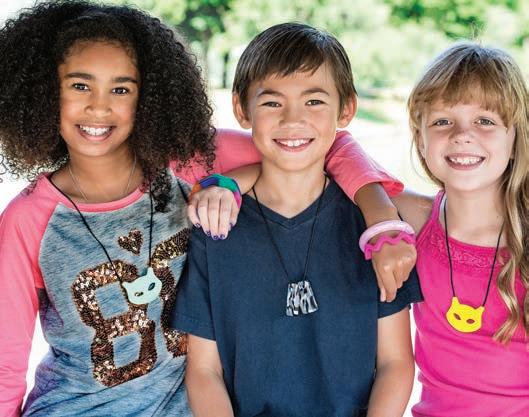
4 Chewigem necklaces
Chewigem necklaces (right) look good while serving the need to chew. They are made of silicone and are soft but strong. Can meet fidget needs as well. chewigem.com
experience a more extreme version of the world. Autistic children will enjoy seeing themselves in this story and it’s a great tool to educate other children about autism.
Hafiza, the author, said: “The inspiration behind the book was my son. Our journey so far has highlighted how little people talk about autism, especially in our South Asian culture. I wanted to highlight, in a light-hearted way, why autistic kids sometimes behave the way they do.”
Suzanne Westbury, Editor of Your Autism
5 CHUIT chewy pencil topper
These chewable pencil toppers are a safe solution for children and adults who need to chew. From cheapdisability aids.co.uk
6 Ark’s robo chewable necklace
A charming chewable robot to help with calm, focus and self-regulation. Available from explore yoursenses. co.uk
Do you have an idea for our six favourites section? Email us at YourAutismMag@nas.org.uk
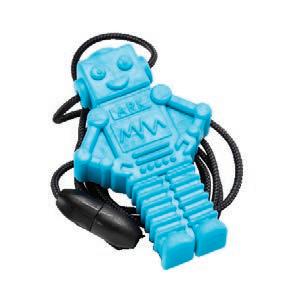
Spring 2023 35
Notebook
Planning for the future to protect your children
We asked Katherine Miller from Renaissance Legal, leading experts in planning for the future of a disabled or vulnerable person, to answer some of your frequently asked questions on Wills and Trusts.

Thinking about a time when you may not be here to support your children can be very frightening for parents. If your loved one is autistic, their future can be especially difficult to think about.
Why should I create a Trust?
A Trust can be a useful tool to provide financial stability for an autistic person throughout their lifetime and when you’re no longer here. It allows you and others to provide for your autistic child without making an outright gift directly to them by placing your assets under the control of Trustees.
Any money held in the Trust will not affect their entitlement to means-tested benefits or local authority funding.
Who can be a Trustee?
A person must be over 18 to be a Trustee and they must be someone that you feel is responsible enough to carry out your wishes and ensure that all decisions are made for the benefit of the beneficiaries. The Trustee can be a family member, a friend or a professional person. It is also possible to appoint a Trust Company to act
as a Trustee. You can appoint any number of Trustees to administer a Trust, but it is most common to have between two and four. If there are too many Trustees then it can be difficult to manage the administration. The Trustees need to work together and make decisions unanimously.
What types of Trusts are available for my child?
The type of Trust required should depend on the individual, the flexibility needed and the value and type of assets involved. The most appropriate types of Trust to consider are a Discretionary Trust, or alternatively, a Disabled Person’s Trust.
In a Discretionary Trust, the Trustees have complete flexibility in deciding how they use the income and capital in the Trust fund for your child’s benefit. This
provides the flexibility required for an autistic child, as the support they need will vary throughout their lifetime, and the Trustees can change the provision they give whenever needed.
A Vulnerable or Disabled Person’s Trust can be used where the main person to benefit from it qualifies as a ‘vulnerable or disabled beneficiary’.
The definition is based on a person’s level of entitlement to Disability Living Allowance (DLA), Personal Independence Payments (PIP) or Attendance Allowance (AA) or by reference to conditions covered under the Mental Health Act 1983.
A Disabled Person’s Trust is given favourable tax treatment for Inheritance Tax, Income Tax and Capital Gains Tax; as the main purpose of the Trust is to provide for a person who is disabled or vulnerable.
For more information on protecting your loved one’s future, please join us on Wednesday 14 June 2023 for our Planning for the Future Webinar with Renaissance Legal. For more information, please contact WillsandTrusts@nas.org.uk

Advertorial
36 Autism
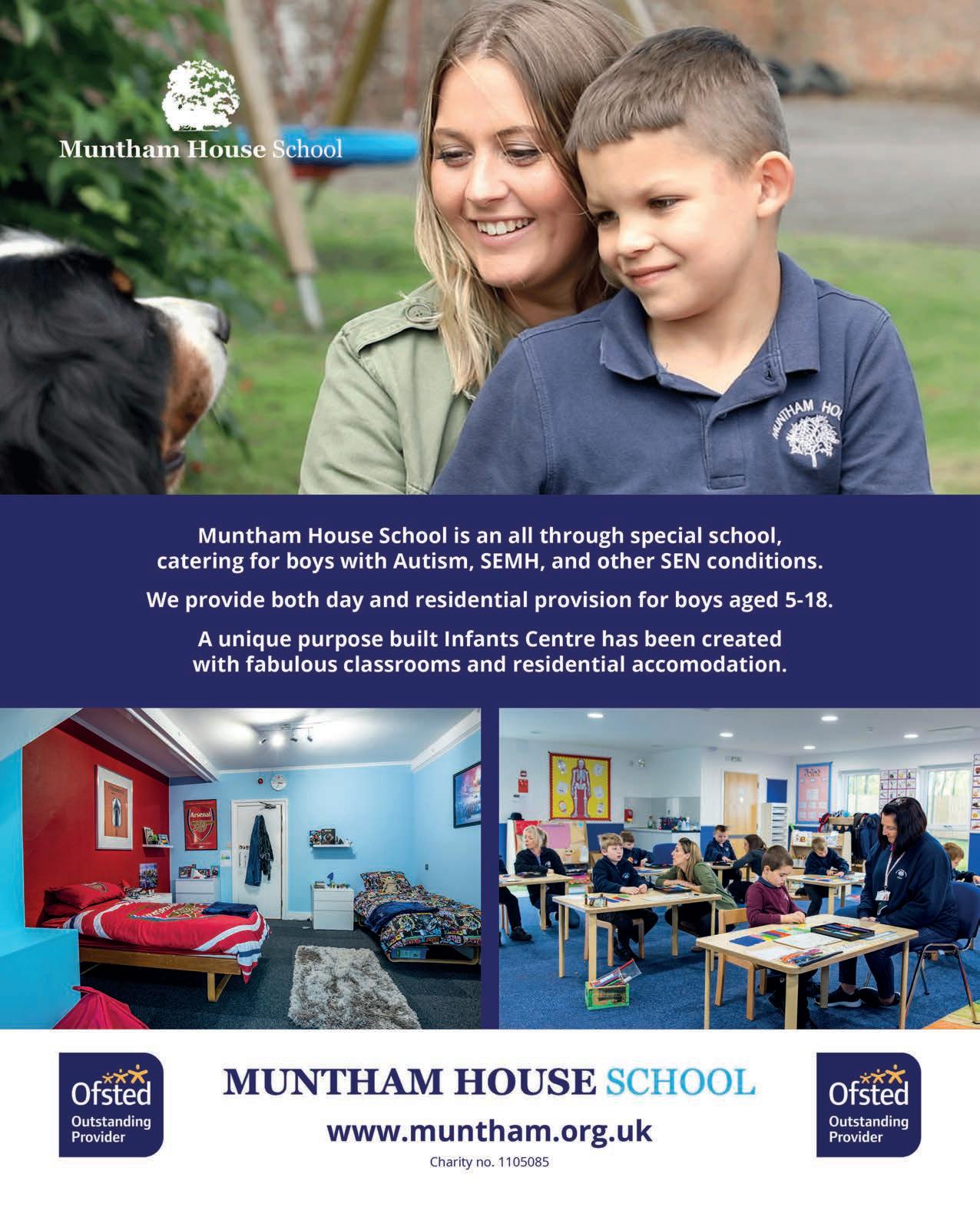
I’m a… bell-ringer
Meet Liam Lamb, a bell-ringer at a church in Warwickshire. We spoke to Liam and his mum, Denise, to find out how he developed his passion for bell-ringing and what his hobby means to him
Liam was diagnosed as autistic at the age of two. “From early diagnosis, everything was put into place for Liam,” said Denise. When he was two and a half years old, he started at a special school, which he attended until he was 19.
Liam also began to go to respite care every six weeks, the site of which backed onto a church. One Saturday in early 2019, Liam and his respite worker got talking to a member of the church, who explained that they rang the bells every Thursday night and asked if Liam would be interested in joining.
“At first, he was [like] no, no, because, when the bells rang, he didn’t like it,” explained Denise. “He would always put his hands over his ears. He was quite noise sensitive. But we took him one week and he absolutely loved it.
“It took Liam a while to get the swing of it. Then, of course, we had lockdown, so he
couldn’t go for 18 months, but he’s picked it up a treat now. They’ll shout out the changes and he knows exactly what he’s got to do.”
Liam explained that ringing the bells and listening to their different tones makes him feel “happy, excited and surprised”.
“It’s something he knows he can do well; he’s good at it and he enjoys it,” added Denise. “There are some weddings that want the bells this year, so he’ll be ringing for the weddings, and he’ll get paid now for that.” Liam is also excited at the prospect of ringing the bells for King Charles’ Coronation in May.
Would Liam and Denise recommend that other autistic people try bell-ringing? “If they’re interested in it, I would say give it a go,” said Denise. “Because it is lovely – and it’s lovely to hear as well. It’s not as easy as people make it look; there is a knack to it, but it’s worth it.”
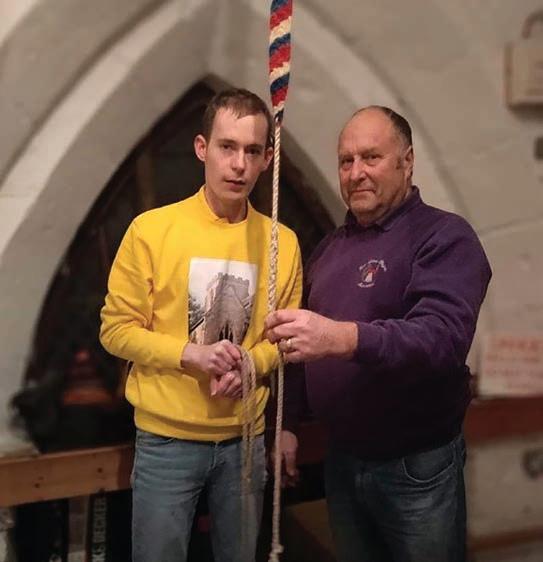
Would you like to share your achievements or passion here?
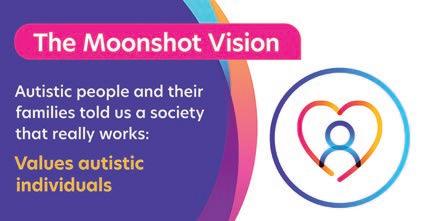
38 Your Autism
Email us at YourAutismMag@ nas.org.uk Snapshot

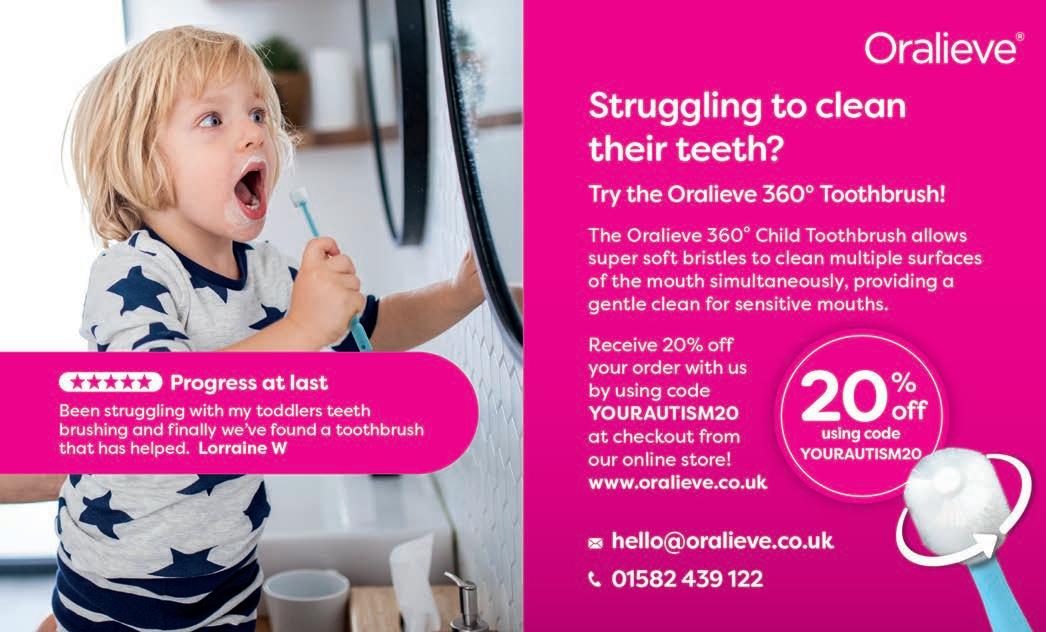
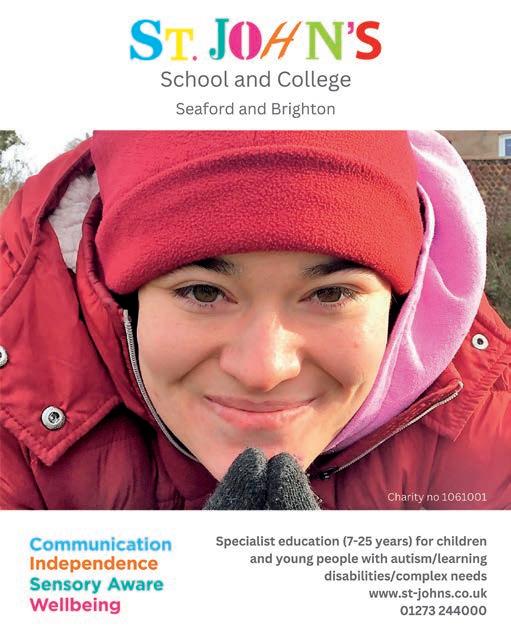
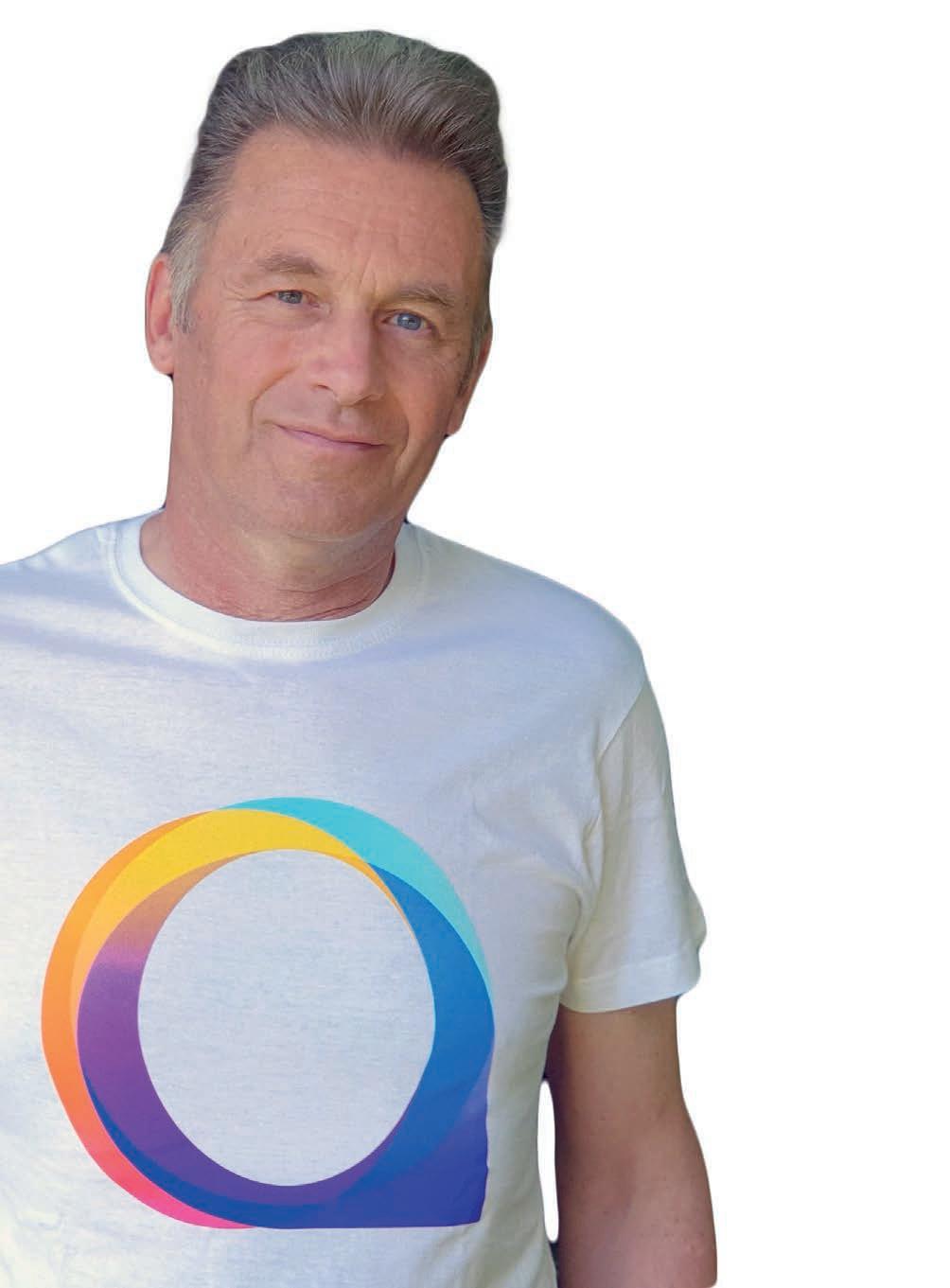
The National Autistic Society is a charity registered in England and Wales (269425) and in Scotland (SC039427)
“To me, autism acceptance means being comfortable having a conversation about how my brain works differently and how this might hinder and help my personality.”
Sign up today www.autism.org.uk/waaw
Chris Packham
















 Join Team Autism at one of our events:
6 Your Autism
Join Team Autism at one of our events:
6 Your Autism






 Interview by Charlotte Gush
Interview by Charlotte Gush











 Interview by Sophie Brown
Interview by Sophie Brown








































